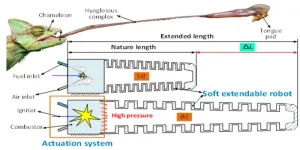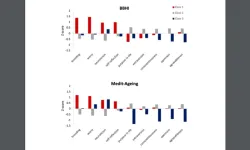(Press-News.org) Surgeons in Germany have shown a small technical change to keyhole surgery for prostate cancer can more than halve one of the most common post-operative complications – where lymphatic fluid collects in the pelvis.
The technique involves creating a small flap in the peritoneum – the lining of the abdomen – and attaching this flap down into the pelvis. This creates a route for lymphatic fluid to escape from the pelvis into the abdomen where it can be more easily absorbed.
The findings are presented at the 2023 European Association of Urology annual Congress in Milan.
Around 10 percent of patients whose prostate cancer and lymph nodes are removed through robot-assisted keyhole surgery require treatment for symptoms caused by lymphatic fluid collecting in the pelvis, known as lymphocele. Lymphocele can also be seen in nearly a third of patients when they were systematically checked, without them reporting symptoms.
Symptoms include superinfection, pain in the pelvis, pressure on the bladder, and swollen legs due to compression of the veins. If left untreated, symptomatic lymphocele can lead to serious infections or deep vein thrombosis.
Draining a lymphocele can take from three days to three weeks, with treatment complete only when the fluid is no longer accumulating. For some patients, this requires a stay in hospital.
Urology specialist Manuel Neuberger from University Medical Centre Mannheim and Heidelberg University said: “When they’ve only just returned home following a cancer operation, the last thing patients need is to return to hospital with this kind of complication, which unfortunately is fairly common. If drainage doesn’t cure the problem, then – in rare cases - the final treatment is to create an artificial opening in the peritoneum, which provides a route out for the lymph so it’s no longer stuck in the pelvis. As it’s such a simple step, why not create a flap as standard, to prevent the condition in the first place?
“Previous studies of the technique have been inconclusive, so we designed a larger, more robust trial to ensure our findings were statistically significant.”
The trial involved over 550 patients and four different surgeons working at University Medical Centre Mannheim, who were only informed whether a patient was to have a peritoneal flap once the rest of the operation had been completed. Patients were also randomised between the two groups – with flap or without – taking into account other factors that might increase the risk of lymphocele, such as diabetes, the extent to which lymph nodes were removed, whether they took anti-coagulants and the surgeon doing the operation. The patients were followed up for six months following the operation.
During the six month follow-up period, only 10 patients in the peritoneal flap group had developed a symptomatic lymphocele, compared to 25 in the control group. At the time of discharge, 20 patients in the flap group had lymphocele with no symptoms, compared to 46 in the control group. During the follow-up, this had risen to just 27 in the flap group, but 74 in the control group.
Professor Philip Nuhn, Professor of Urology at University Medical Centre Mannheim, who led the research, said: “Using the peritoneal flap reduced the incidence of lymphocele from nine percent to less than four percent. We now use this as the new standard in Mannheim, and hope that – following these results – it will become common practice elsewhere as well.”
Professor Jochen Walz, from the EAU Scientific Congress Office and the Institut Paoli-Calmettes Cancer Center in Marseille said: “Most problems in these operations are linked to the lymph node removal, rather than the prostate surgery itself. Removal of the lymph nodes allows us to see if the cancer has spread, so it’s important to do, particularly as surgery is now mainly used in higher risk patients. Creating a peritoneal flap is a simple, small, easy and quick procedure that takes about five minutes to complete. It is totally safe and this trial has shown it can substantially reduce complications, so there’s no reason why surgeons should not now do this as standard.
“Randomised control trials to evaluate technical changes in surgery are notoriously difficult to do – but this study has shown that they are both possible and effective. That’s good news for surgeons and for patients, who will benefit from better outcomes as a result.”
Ends
END
New technique reduces postoperative complications in prostate cancer surgery
2023-03-12
ELSE PRESS RELEASES FROM THIS DATE:
UK study finds vasectomies are even safer than reported
2023-03-12
Vasectomies are much less likely to cause complications than expected, according to a new UK study reviewing the outcomes from over 90,000 vasectomies performed over 15 years.
The study, led by researchers from Gloucestershire Hospitals NHS Foundation Trust, is being presented today at the European Association of Urology (EAU) Congress in Milan.
It shows that existing leaflets explaining the potential complications to patients are based on outdated figures.
Around 11,000 vasectomy operations are performed every year ...
Difference between “growers” and “showers” revealed
2023-03-12
A scientific definition to determine whether a man’s erection can be deemed a "grower " or a "shower" has been produced by researchers.
The findings are presented today at the European Association of Urology (EAU) Congress in Milan.
Urologists based at three hospitals and a clinic in Madrid conducted ultrasound scans on 225 men in both flaccid and then erect states.
The researchers, led by Dr Manuel Alonso-Isa, a urologist at the University Hospital HM Puerta del Sur in Madrid, Spain, had hoped to find factors among the men that would predict if they fell into one of these ...
Delaying treatment for localised prostate cancer does not increase mortality risk, trial shows
2023-03-12
Active monitoring of prostate cancer has the same high survival rates after 15 years as radiotherapy or surgery, reports the largest study of its kind today.
The latest findings from the ProtecT trial, led by the Universities of Oxford and Bristol, are presented today at the European Association of Urology (EAU) Congress in Milan and published in the New England Journal of Medicine.
The trial was funded by the National Institute for Health and Care Research (NIHR).
Although men on active monitoring – which involves regular tests to check on the cancer – were more likely to see it progress ...
Clinical trial shows wrist device significantly reduces tics in Tourette syndrome
2023-03-12
The results of the clinical trial of a new wrist device designed to help control the symptoms of Tourette syndrome have shown it significantly reduces the severity and frequency of tics.
The prototype wrist device, which was recently tried out by Lewis Capaldi, delivers electrical pulses to reduce the amount and severity of tics experienced by individuals with Tourette’s and was trialed by 121 people across the UK. The results have been announced in MedRxive.
The device has been developed by scientists at the University of Nottingham and spin-out company Neurotherapuetics Ltd who have recently secured £1m in additional funding to ...
Design of a fuel explosion-based chameleon-like soft robot aided by the comprehensive dynamic model
2023-03-11
A research paper by scientists at the Beijing Institute of Technology and University of Lancaster displayed a recent advancement of using fuel explosion as the power of source to achieve the rapid and powerful motion for the medium-size robots.
The new research paper, published in the journal Cyborg and Bionic Systems, provided a new kind of actuation system for the robotic system, providing a promising patentability to largely improve the working length of the conventional medium-size robotic systems.
“Achieving the rapid and fast motion of the medium-size robot has been a challenging task for many years, …” ...
Looking for risky viruses now to get ahead of future pandemics
2023-03-11
COLUMBUS, Ohio – Most of what scientists know about viruses in animals is the list of nucleotides that compose their genomic sequence – which, while valuable, offers very few hints about a virus’s ability to infect humans.
Rather than let the next outbreak take the world by surprise, two virologists say in a Science Perspective article published today (March 10, 2023) that the scientific community should invest in a four-part research framework to proactively identify animal viruses that might infect humans.
“A lot of financial investment has gone into sequencing viruses in nature and thinking that from sequence alone we’ll be ...
MSU-led international research network welcomes new Ibero-American partner to advance nuclear astrophysics
2023-03-11
EAST LANSING, MI – The International Research Network for Nuclear Astrophysics (IReNA), supported by the National Science Foundation (NSF) and headquartered at Michigan State University (MSU), brings together nuclear physicists, astronomers, and computational scientists to try to answer a long-standing question in science: Where do the elements that make up our world come from?
Founded in 2019, IReNA continues to expand its global reach for cooperation to advance knowledge in nuclear astrophysics, and now welcomes a new network partner: the Ibero-American Network of Nuclear ...
Aging | Cognitive aging and dementia prevention: The time for psychology?
2023-03-11
“[...] there is a need to explore brain mechanisms through which psychological processes may exert their protective or deleterious effects.”
BUFFALO, NY- March 10, 2023 – Aging (listed by MEDLINE/PubMed as "Aging (Albany NY)" and "Aging-US" by Web of Science) published a new editorial paper in Volume 15, Issue 4, entitled, “Cognitive aging and dementia prevention: the time for psychology?”
Modifiable risk and protective factors (e.g. engaging in active lifestyles ...
New platform allows researchers to listen in on cell-cell crosstalk
2023-03-11
Inflammatory neurological diseases, such as multiple sclerosis (MS), can arise when cell-to-cell communication between cells in the central nervous system (CNS) goes awry. But exactly how this cellular crosstalk leads to the molecular changes that drive disease remain unknown. To address this, researchers from Brigham and Women’s Hospital, a founding member of the Mass General Brigham health care system, developed a platform that allows them to perform genetic screens of cell-cell interactions to identify genes that control biologic processes. ...
Enzyme ATE1 plays role in cellular stress response, opening door to new therapeutic targets
2023-03-11
A new paper in Nature Communications illuminates how a previously poorly understood enzyme works in the cell. Many diseases are tied to chronic cellular stress, and UMBC’s Aaron T. Smith and colleagues discovered that this enzyme plays an important role in the cellular stress response. Better understanding how this enzyme functions and is controlled could lead to the discovery of new therapeutic targets for these diseases.
The enzyme is named ATE1, and it belongs to a family of enzymes called arginyl-tRNA transferases. These enzymes add arginine (an amino acid) to proteins, which often flags the proteins for destruction in the cell. Destroying ...




